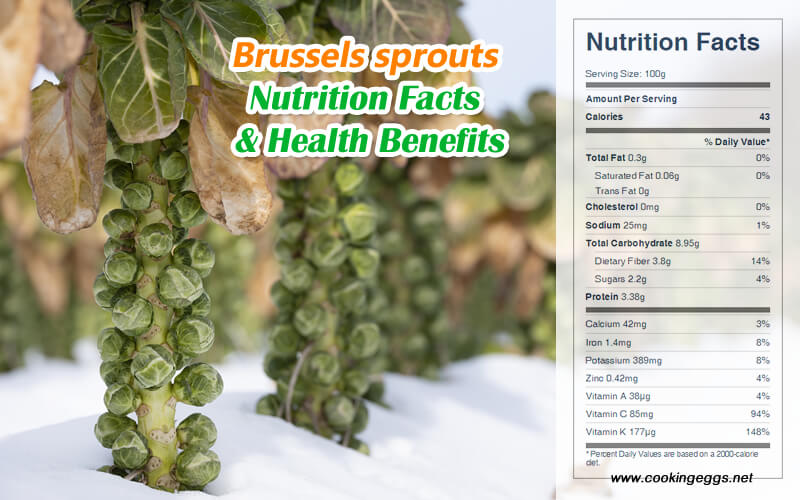Brussels sprouts Nutrition Facts & Health Benefits
Brussels sprouts are a cruciferous vegetable belonging to the cabbage family. grown for its edible buds, which resemble miniature cabbages.
Brussels sprouts are the mid-range members of the cruciferous vegetable line and are an excellent source of vitamins C and K, beta-carotene, and fiber. They are also a good source of vitamins B6 and C, folic acid, flavonoids, calcium, iron, and phosphorus.

The nutritional value of Brussels sprouts
Raw Brussels sprouts are 86% water, 9% carbohydrates, 3% protein, and negligible fat. In a 100 gram reference amount, they supply high levels of vitamin C (94% DV) and vitamin K (148% DV), with more moderate amounts of B vitamins, such as folate and vitamin B6, essential minerals, and dietary fiber.
One-half cup of cooked Brussels sprouts provides 30 calories, 6.8 g carbohydrate, 2 g protein, 0.4 g fat, 2 g dietary fiber, 561 IU vitamin A, 48 mg vitamin C, 47 mcg folic acid, 247 mg potassium, 16 mg sodium, 28 mg calcium, 44 mg phosphorus, 16 mg magnesium, and 0.94 mg iron.
Brussels sprouts Nutrition Facts Label
Health Benefits of Brussels sprouts
Brussel sprouts have a positive effect on reducing inflammation. As we know, having a state of chronic inflammation can lead to the development of many chronic diseases, including heart disease, autoimmune conditions, and cancer.
Brussels sprouts are a cruciferous vegetable. The family also includes broccoli, cabbage, collard greens, kale, bok choy, and kohlrabi. Current research suggests vegetables in this group offer protection against some forms of cancer. They have antioxidant effects.
Brussels sprouts contain indoles, which are believed to prevent breast cancer by blocking the activity of estrogens that contribute to tumor growth and sulforaphanes, which block carcinogens from damaging healthy cells.
Brussels sprouts are an especially rich source of sinigrin, which has been shown to prevent the formation of cancer cells. Sulfur-containing phytochemicals called glucosinolates are the major group of natural plant biochemicals in this family of vegetables. They are also responsible for the bitter flavors and distinct colors.
Glucosinolates are broken down in the body into various bioactive products. The protective antioxidant effect of these vegetables is attributed to isothiocyanates. Studies have been looking at Brassica vegetables for their anticancer abilities, which are linked to the presence of isothiocyanates.
The presence of ITCs in Brussels sprouts works to reduce the activity associated with inflammatory mechanisms, promote detoxification enzymes, scavenge free radicals as an antioxidant, and induce immune function within the body. The ability to scavenge free radicals is achieved by activating the Nrf2 transcription pathway. This helps to decrease the release of the different pro-inflammatory cytokines that contribute to inflammation.
Brussels sprouts, as with broccoli and other brassicas, contain sulforaphane, a phytochemical under basic research for its potential biological properties. Although boiling reduces the level of sulforaphane, steaming, microwave cooking, and stir-frying do not cause a significant loss.
Brussels sprouts have the potential to be especially good for supporting the health of your colon. They are also considered a preventative for colon cancer, and their high fiber content promotes bowel health.
Unlike most green vegetables, Brussels sprouts are rather high in protein. Although the protein is incomplete (lacking the full spectrum of essential amino acids), serving it with a serving of whole grains will make it complete.
Health Risk
Note: For some people, especially those prone to constipation, Brussels sprouts may induce gas and bloating; remember, however, that this reaction is caused by the vegetable's cleansing activity.
Consuming Brussels sprouts in excess may not be suitable for people taking anticoagulants such as warfarin since they contain vitamin K, a blood-clotting factor. In one incident, eating too many Brussels sprouts led to hospitalization for an individual on blood-thinning therapy.